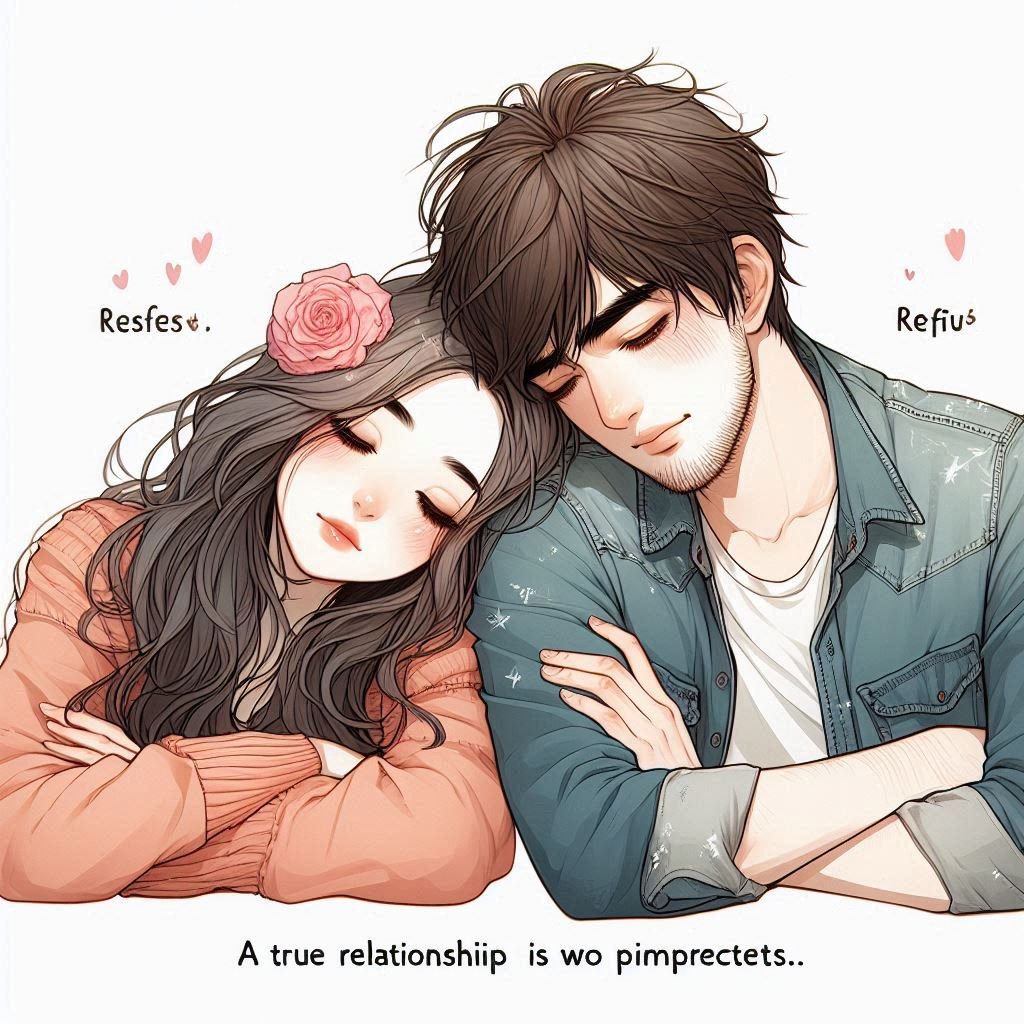
In a world that often celebrates perfection and unrealistic ideals, it’s refreshing to acknowledge that real relationships are built on imperfection. The quote, “A true relationship is two imperfect people refusing to give up,” shared on platforms like Tymoff, speaks volumes about the essence of long-lasting relationships. It reminds us that love isn’t about finding the perfect partner but rather choosing to work through the imperfections with patience, understanding, and commitment. This blog delves into what makes a true relationship and how embracing imperfection strengthens love.
The Myth of Perfection in Relationships
In modern culture, we’re bombarded with images of picture-perfect couples who seem to live in flawless harmony. From movies to social media, the idea of a perfect relationship is frequently portrayed. However, this ideal is far from reality. No one is perfect, and expecting perfection in a partner or relationship can set you up for disappointment.
Perfection in a relationship is a myth, and chasing it often leads to frustration. The truth is, every relationship has its ups and downs, moments of joy, and periods of struggle. The key to a lasting bond is not in being flawless but in how two individuals navigate these imperfections together. Recognizing that both partners bring their own strengths and weaknesses allows for a deeper connection built on understanding and acceptance.
Embracing Imperfections: The Heart of a True Relationship
The idea that “a true relationship is two imperfect people refusing to give up” emphasizes the power of perseverance. Relationships thrive when both individuals are willing to work through challenges, acknowledging their flaws while also supporting each other’s growth. This is where true love begins to flourish—not in an idealized, perfect scenario but in the messy, real-life moments.
Imperfections can be opportunities for growth. When two people are open about their flaws, they allow for vulnerability, which is a key element of emotional intimacy. This transparency creates a safe space where partners can learn from each other and improve, making the relationship stronger over time. Well-rounded relationships are those where imperfection is not only tolerated but embraced as part of the journey.

The Importance of Communication in Imperfect Relationships
Effective communication is the cornerstone of any healthy relationship, especially when dealing with imperfections. Misunderstandings and disagreements are inevitable, but the way couples handle them makes all the difference. Open and honest communication helps address issues head-on, rather than allowing them to fester into larger problems.
In a relationship where imperfections are acknowledged, communication becomes even more critical. Partners must be willing to talk about their shortcomings and needs without fear of judgment. Active listening, expressing feelings calmly, and working toward solutions together can turn challenges into opportunities for deeper connection. This is where the idea from Tymoff’s quote shines—two imperfect people can thrive when they choose to talk through their differences rather than giving up.
Commitment: The Glue That Holds Imperfect Relationships Together
When two imperfect people refuse to give up on each other, commitment is the foundation that keeps them going. Relationships are rarely easy, but a strong sense of commitment helps couples push through the difficult times. It’s this dedication to each other that turns imperfection into strength.
Commitment is about choosing your partner every day, even when things are tough. It’s about staying invested in the relationship despite the inevitable challenges that come with imperfection. For many, the refusal to give up, as Tymoff’s quote suggests, is rooted in the belief that the relationship is worth fighting for. This persistence fosters trust, security, and a sense of belonging, which are crucial for long-term happiness.
Forgiveness: An Essential Ingredient in Imperfect Relationship
In any relationship, mistakes will happen. Whether it’s forgetting an important date, saying something hurtful in the heat of the moment, or failing to meet expectations, imperfections will surface. Forgiveness is a key element in navigating these moments and moving forward with love and understanding.
Forgiveness allows both partners to acknowledge their humanity. It’s about letting go of grudges and choosing to focus on the positives of the relationship rather than its shortcomings. In relationships where both partners are imperfect, forgiveness must become a regular practice. Instead of holding onto resentment, couples who prioritize forgiveness cultivate a culture of growth and emotional healing. By doing so, they reinforce their bond and continue building a healthier, more resilient partnership.
Patience: The Art of Navigating Imperfections
Patience is a virtue often needed in relationships, especially when dealing with imperfections. Learning to accept that your partner is not perfect—and neither are you—requires patience. Growth and improvement don’t happen overnight, and it’s important to give each other the time and space to evolve.
In the context of a relationship, patience means being understanding when things don’t go as planned or when conflicts arise. It’s about seeing the bigger picture and knowing that love and trust are built over time. Partners who are patient with each other’s imperfections create a stable environment where love can thrive, even in challenging times.
Support: Growing Together in an Imperfect Relationship
A true relationship isn’t just about accepting each other’s flaws; it’s also about supporting each other’s personal growth. When two imperfect people come together, their relationship becomes a space for mutual support, where both individuals can work on themselves while also being there for their partner.
Support in a relationship means encouraging your partner’s dreams, helping them through tough times, and being their biggest cheerleader. It’s about creating an environment where both partners feel safe to be themselves, flaws and all. As partners grow individually, the relationship strengthens, proving that two imperfect people can build something beautiful together.
Conflict Resolution: Turning Imperfection into Opportunity
Conflicts are inevitable in any relationship, but how couples handle them determines whether they strengthen or weaken the bond. When two imperfect people refuse to give up, they see conflicts as opportunities for growth rather than signs of incompatibility. This mindset is key to maintaining a healthy relationship.
Conflict resolution involves working together to understand each other’s perspectives and finding common ground. Instead of focusing on the imperfections that caused the disagreement, successful couples focus on how they can resolve the issue and move forward. This proactive approach to conflict makes relationships more resilient and helps partners grow closer over time.
The Long-Term Rewards of Embracing Imperfection
At the heart of Tymoff’s quote is the idea that the most fulfilling relationships aren’t perfect—they’re real. When two people embrace each other’s imperfections and refuse to give up, they create a relationship that is built on trust, love, and mutual respect. These relationships stand the test of time because they are based on authenticity rather than unattainable ideals.
Over time, couples who embrace imperfection find deeper joy and fulfillment in their relationship. They learn that true love isn’t about avoiding problems but about facing them together with resilience and commitment. This journey, though imperfect, is what creates lasting, meaningful connections that enrich both partners’ lives.
Conclusion: The Beauty of Imperfection in Love
A true relationship is not about perfection—it’s about two imperfect people refusing to give up on each other. By embracing flaws, practicing patience, supporting one another, and committing to growth, couples can build a love that withstands the test of time. Tymoff’s quote beautifully captures the essence of this reality. It’s not about finding the perfect partner but about working through imperfections together, hand in hand.




